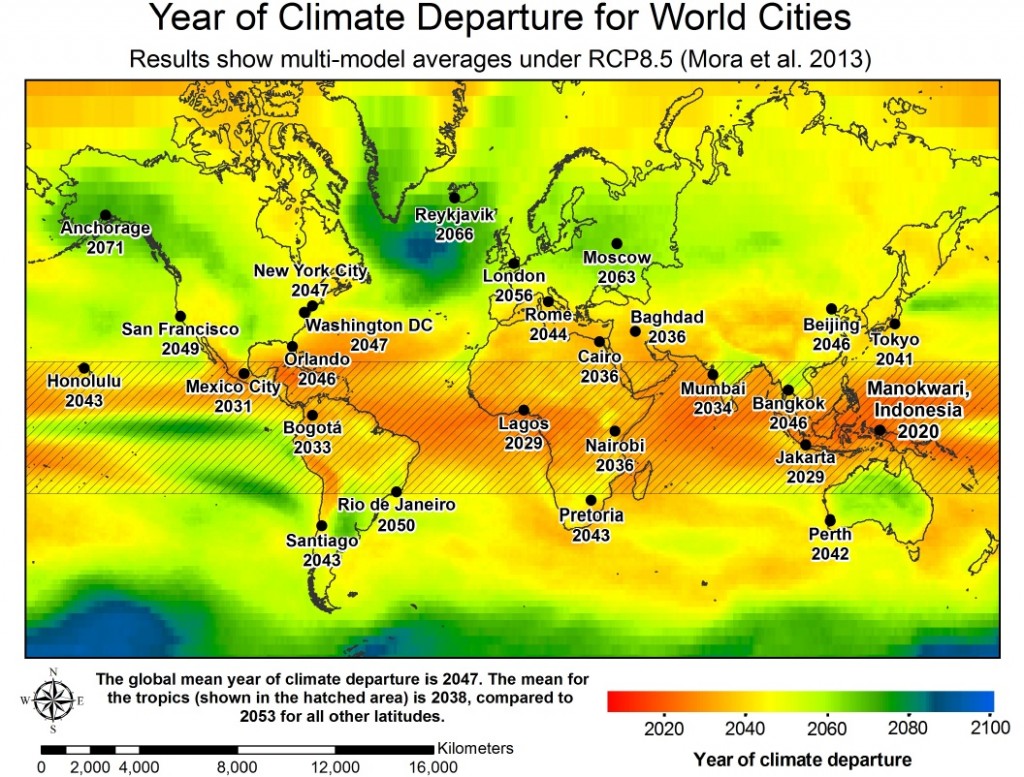Search Results for Tag: climate departure
Departing from the world as we know it

Rich benthic fauna and associated reef fish, Southeast Sulawesi, Indonesia.
(Photo credit: Keoki Stender, Marinelifephotography.com)
In light of the coming climate conference COP19 in Warsaw a new study published today in the scientific journal Nature highlights the importance of urgent greenhouse gas (ghg) mitigation: Researchers say that weather extremes will eventually move beyond anything that could be explained by natural climate variability.
Sceptics often argue that what the majority of scientists call climate change is just natural variability. And the fact that the earth did not get warmer for the last 16 years they take as a proof that climate researchers’ predictions are wrong. Obviously climate scientists couldn’t disagree more, and this study further undermines the sceptics’ argument. From the data they conclude that at some point – the so called “climate departure” – climate extremes will even surpass anything we have have seen in the last 150 years of a changing climate.
If you think that is now at a distant point of time – far from it! Depending on the volume of GHG emitted, this “climate departure” could already happen in the middle of this century. In a low emission scenario (which requires limiting CO2 concentration to 538 ppm by 2100 – from around 393 ppm nowadays) mean climate would move out of historical bounds by 2069 on world average. In a business-as-usual scenario (936 ppm by 2100) these boundaries would already be exceeded by about 2047 on world average.
For their experiment, the researchers compared historical climate variability with the projections for a future time period until 2100. They defined historical climate variability for the period of 1860 to 2005 – a time when anthropogenic influence on climate has already been at play. Excluding this anthropogenic GHG emission from their calculations, climate departure would set in about 18.5 years early in a low and 11.5 years earlier in a business-as-usual scenario.
“The results shocked us. Regardless of the scenario, changes will be coming soon,” said lead author Camilo Mora of Social Sciences’ Department of Geography at the University of Hawaii, Manoa, in a press release. “Within my generation, whatever climate we were used to will be a thing of the past.”

Shown in grey is the historical variability of temperature. Just referring to this factor, climate depature would be at 2036 in a low emission scenario – as temperature of all following years (red area) would be outside of the historical bounds (Photo credit: Mora et al., 2013)
For their calculations of climate departure year, the team did not only look at air temperature (as shown above), but also at several more factors that determine climate change – such as sea surface temperature, precipitation, evaporation, and acidification of oceans. As these factors differ spatially, the researchers developed an map showing the departure dates for several cities.
What happens in consequence to climate departure, depends on the biological properties of that region: How well can species adapt to new conditions? Can they migrate to more suitable habitat? How will migration affect interaction with other species? In the highly biodiverse tropics (dashed area on the map) for example, the shift will occur far earlier than in other parts of the world. At the same time, precedent climate variability is quite low in this area and thus species are not used to varying conditions and might fail to adapt to new ones. That is why this climate shift threatens biodiversity of these regions.
But this is not only about plants and animals – also five billion people will be affected by the climate shift by 2050 in a business-as-usual-scenario. People, that are mainly living in developing and low-income-countries. This leads the scientific researchers to an almost political demand: “This suggests that any progress to decrease the rate of ongoing climate change will (…) require more extensive funding of social and conservation programmes in developing countries to minimize the impacts of climate change (…) if widespread changes in global biodiversity and human societies are to be prevented.”





Feedback